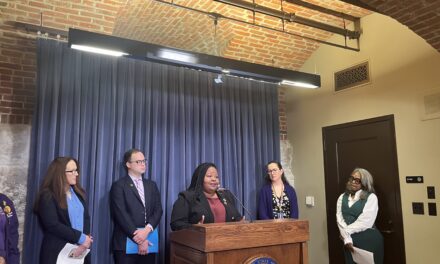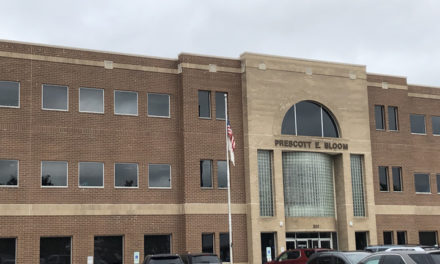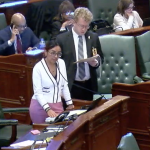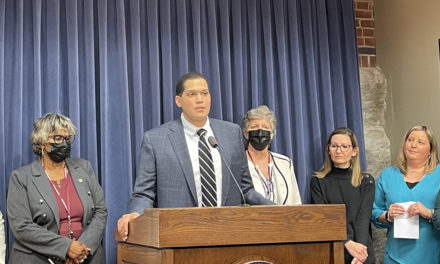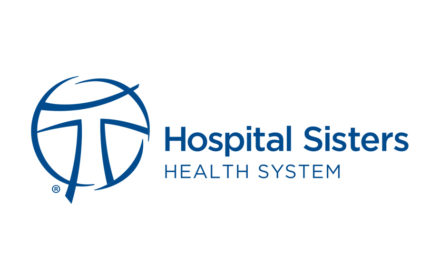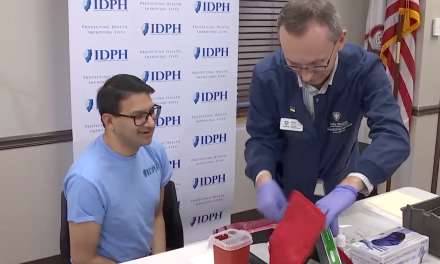
Chestnut’s David Sharar, Thresholds’ Mark Ishaug talk increased funding to support mental health workforce
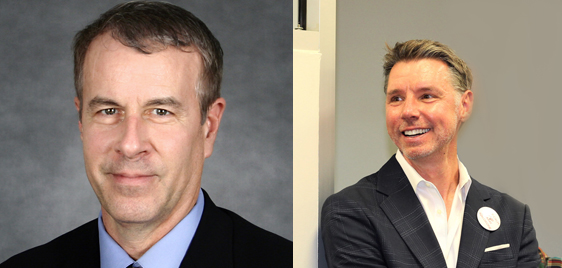
As lawmakers continue budget discussions, a coalition of mental health providers has come together to urge more funding for mental health services.
Specifically, they are calling for lawmakers to back proposals by House Majority Leader Greg Harris, D-Chicago, and Sen. Elgie Sims, D-Chicago, that would provide $130 million in additional funds for mental health services and $40 million for substance use treatment.
Gov. JB Pritzker’s budget calls for a similar amount of funding for mental health services.
“I don’t think it’s too strong to call this a lifeline,” Thresholds CEO Mark Ishaug told Health News Illinois this week about the funding options. “This is game-changing.”
Ishaug, as well as Chestnut Health Systems CEO David Sharar, also talked about the increased demand for services and the state of the mental health workforce entering the third year of the pandemic.
Edited excerpts are below.
HNI: What are you looking at this spring session as it relates to funding for mental health services?
Mark Ishaug: We are, I would say, cautiously optimistic, but continuing to work hard to continue to build support through an effort that is called the Rebuild Illinois Behavioral Health Workforce Coalition, of which Thresholds, Chestnut, Rosecrance and scores of other community mental health and substance abuse agencies are part of. Our hope is that we will receive as a sector about $180 million in new funding for community mental health and community outpatient substance abuse treatment. Much of that, more than 50 percent, will be matched by Medicaid.
David Sharar: As you’re probably aware, there’s been a very severe workforce shortage. I mean, it’s all over the news, but it’s hit community behavioral health really hard. In some ways, that’s caused some real adverse consequences such as program closures or suspended admissions or long surging waiting lists and so forth. And really the only way to address this is increased funding. We haven’t really seen much of a Medicaid increase in our field for a long time. And we’re grateful that Leader Harris took the initiative to see this and put some legislation forward to try to increase funding for community behavioral health because really our very infrastructure is at risk if we don’t do something.
HNI: Have you had a chance to speak with lawmakers on the request? If so, how have those conversations gone?
MI: I’ve been doing this work in Springfield for 31 years … And I have never in my entire career, experienced more support for this effort. And this is an appropriations effort. That’s hard in any given year, but to have such widespread, bipartisan support from every corner of the state.
DS: I have to say, when it comes to this particular issue, I’m relieved. And it’s restored some of my faith that true bipartisanship exists. We’ve seen both Republicans and Democrats in our downstate areas – we’re in Bloomington, which is more Republican – but both our representative and our senator here have co-sponsored this. We’re also in the Metro East, which is more Democratic, and everybody’s totally on board. So the support has been outstanding.
HNI: In general, what would this increased funding mean for providers like yourself?
MI: I don’t think it’s too strong to call this a lifeline. This is game-changing. Every year our health insurance costs go up with no new resources to pay for that. Every single year, we want to give wages and bonuses and more PTO and all the resources that we need to train them to be the very best that they can be as a behavioral workforce. So this is simply a game-changer to us. Thresholds has invested a lot of money over the last two years, thanks in part to the state, thanks in part to the federal (Paycheck Protection Program) and we are leaving no stone unturned. But those were wonderful short-term, temporary investments. This, a rate change, and what we’re proposing to pay for new rates for therapy, for case management, for outreach, for assertive community treatment, these dollars will be able to enable us to invest in our staff with the wages and benefits that they need and deserve.
HNI: What’s the state of the behavioral health workforce as we enter the third year of the pandemic?
MI: It’s all of us, right? From the front desk clerks to the CEOs, it’s hard. And I would say that at least in our workforce, we have rallied together. We have supported each other in every way that we can. We’ve done it monetarily. We’ve done it through online support. We’ve done it through reminding our staff every single day how much they are appreciated and how much they are loved and how much they are valued. And we have to both tell them that and show them that. And part of the way that we show them this … is giving them inspiration and gratitude for their hard work and remunerating them in the ways that they deserve.
But it has been really, really hard, for all the reasons that I mentioned. Individuals are struggling, families are struggling, but I think the people that work at Thresholds are so mission- and client-driven, even in the toughest times and the darkest times. Our workforces’ love and compassion for the people that we serve, the most vulnerable, those with the most serious mental illnesses and substance use challenges, many of whom are homeless, many of whom were in institutional settings and could go there were it not for Thresholds, I think that their love and kindness drives them. Otherwise, our workforce challenge would be so much worse than it is. It’s bad, I don’t want to underestimate it. Otherwise, we wouldn’t have these bills and the governor’s support. It’s bad, but it would be so much worse if I didn’t have 1,200 people who cared for and deeply love our clients.
DS: There are anywhere between 5,000 and 8,000 openings in community, not-for-profit community-based services. That just clearly has a huge impact with that many openings. For example, we talked about staff, we also looked at the impact on clients. When you can’t do an admission because you don’t have a 24-hour nurse to work a weekend, and you have to suspend admissions to, for example, a non-hospital detox program, what happens to that client that doesn’t get admitted? And you worry about that, that they will end up in despair, they will end up in an overdose, they will end up in jail, they’ll end up in a domestic violence situation, you just don’t know. And so there are downstream costs to not addressing this problem, particularly with our Illinois citizens who are on Medicaid, those at or near or below poverty level.
HNI: What sort of demand for service have we seen over the past several years during the pandemic?
MI: The demand is just growing. I’s a combination of the opioid crisis, death by suicide, anxiety, depression, PTSD, I mean the list just goes on. All the studies have shown that mental health challenges, not just serious mental illness, have skyrocketed during the pandemic.
We have an intake department, because we are so big and so spread out, and right now what our intake department folks are mostly having to tell people is, ‘no, no, no, no, no.’ Can you imagine coming to work every day, I mean it almost brings tears to my eyes, I cannot imagine doing that work. When moms and dads or brothers or sisters or a hospital discharge planner calls and says, ‘I have somebody that needs Thresholds help’ and we have to say ‘no.’ For the last couple of years, we have turned away thousands of people who need us because we do not have the workforce to meet that demand. So whatever is invested, $180 million and more, will be used to help us sustain and grow our staff because the need is so, so deep. Illinois ranks very low right now on community mental health compared to our other states, and as I’ve said, I think this is going to be the game changer. The need is just off the charts, and I’m hoping that beginning in the next fiscal year, we’re going to be changing that story in every place, from Rockford to East St. Louis, from Carbondale to Bloomington. We’re in a watershed moment in Illinois, when we’re going to go from one of the most challenged states in terms of mental health to one of the leaders.
DS: There’s a huge increase in demand and it’s coming from all sectors. It’s one of the reasons why there’s such a shortage because … we’ve got licensed clinicians who now have opportunities to be in private practice, to work from home in telehealth or digital health environments where they get paid more, get paid faster, have less documentation. So there’s a demand even from the commercial private pay sector. Certainly in our area, dealing with predominantly Medicaid, that demand was off for a while when COVID first hit. Now, I think we’re just starting to see the impact that it’s had. So demand is up, but staffing is down. That’s our real dilemma.

